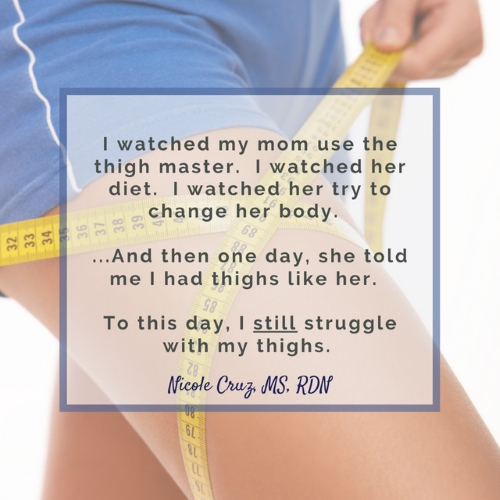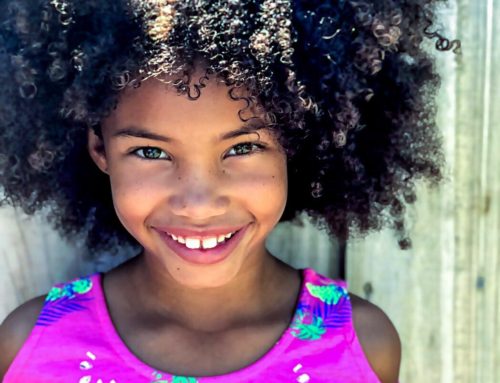Your negative body image: Do you spend time looking in the mirror and scrutinizing your body? Or when you get together with a friend, are you comparing your body to theirs? Do you regularly criticize your appearance?
If you do, you’re not alone! We live in a dieting society, so this is absolutely normal.
I grew up in diet culture too.
Raise your hand if you remember the thigh master. Maybe you even had one.
I had one in my home, along with other tools like tape measures, powdered drink packets, and Jane Fonda workout VHS tapes. These all belonged to my mom.
My mom had a negative body image.
I love my mom to pieces. She’s an amazing woman, supportive mom, and one of the most generous and kind women I know. She always has and I know she always will, want the best for her family and always put us first.
AND… she is a product of diet culture. I saw her try every diet under the sun and try to lose weight. I watched her measure her legs, complain about them, do the Thigh Master, and try to shrink them. And then one day she said to me in conversation… Honey, you have legs like me.
I know she wasn’t intending to be critical of me. She said it sweetly. She doesn’t remember the comment, but to this day, I remember it like it was yesterday. I know where I was and how I felt.
And what I heard… something is wrong with your legs.
What is Body Image?
According to PsychAlive: Body image is the perception you have of your own body and the thoughts and feelings that arise from that perception. These thoughts and feelings can be positive or negative and they are influenced by individual and environmental factors.
If you’re like me and my mom, I know you want the best for your child. You never want to hurt them, and you want to raise them to be happy and confident. Yet, you also live in diet culture, and because you’re inundated with diet messaging and a million ways you can change your body, you might also inadvertently pass that message onto your child.
How You Might Affect Your Child’s Body Image
Talking About Your Body Negatively
It’s common, especially for women, to engage in circles of body shaming. We sit around and talk about how we need to get rid of our cellulite, rolls, and “bat wings.” We also might do it in private or in front of our children, such as looking in the mirror and grabbing your stomach or pinching your arm with disappointment while your child is watching. It might even be in a way that seems complimentary to your child, like “You’re tummy’s so cute and flat, not like mommy’s big belly.”
Dieting or Using Diet Tools
As I described above, my mom didn’t tell me to diet or measure myself, but she showed me how. She taught me that’s what women do, and that a body like hers is not ok the way it is. When you go on a diet or consistently eat different food in front of your child, they will notice. For instance, if every time your family gets pizza, you only eat salad. Or when you make the family spaghetti, you skip the noodles and opt for veggies instead. You also demonstrate this by weighing yourself or your food or measuring your body. Children absorb everything, even if nothing is said.
Controlling Your Child’s Food
When you try to limit the amount of food your child can eat or certain types of food, it sends the message that their body needs to be controlled. They receive the messages: I can’t be trusted around food. Something is wrong with my body.
Affirming There’s a Preferential Body Type
This can be done in different ways. It might be by always commenting on thin body types, and never commenting on larger bodies, as beautiful. When your child comes to you comparing their body with someone else’s and you say, “We just don’t have bodies like them. Some people are lucky,” or making general comments in the same way. “Some people are just blessed with good genes.” All of these actions confirm there’s a “good” or “better” body.
Helping Your Child Diet
If your child comes to you unhappy or crying because they want to lose weight or someone called them fat, it’s normal to want to take away the pain. That can easily get transferred to wanting to help them change. “Then let’s start exercising more. Or let’s go on “X” diet or program together.” While well-intended to help build confidence and ease the pain, these responses confirm the message, “I need to change. My body’s not ok the way it is.”
Commenting on Your Child’s Body
This might go without saying, but I’ve heard too many stories to not state the obvious. In simple terms, if you notice your child’s body changing, avoid commenting. Making a neutral statement such as: It looks like you’ve gotten taller, we should get you some new pants, is likely not going to be harmful. However, comments like Look at your hips, they’re really filling out, can be hard to hear for a child or teen and may draw more attention to their body.
Commenting on appearance inherently makes it seem as though appearance is important. Even a compliment may create fear: what if my body changes? Try to avoid commenting, even if you think it might be positive.
To this day, I still focus on my thighs.
My mom commented on my thighs. She brought attention to them. It was subtle and unintentional, but it was there.
As parents, when we diet or eat differently, talk about our bodies negatively, or try to change our bodies in any way… our children are watching and absorbing. They’re picking up on everything, whether we know it or not.
Today I still struggle to accept my thighs; they’re the part of my body I want to change the most.
I have to actively work to challenge my thoughts. To say to myself, I’m ok the way I am. I’m not putting energy into this. I focus on how my legs carry me through this life and allow me to do the things I enjoy, and to do them with ease and strength. But it’s work. It’s work because at one point I was told my legs are wrong.
Can you relate? Do you remember being told (in some way) your body is wrong?
Stay tuned for next week: How to Help Your Child Develop a Positive Body Image




Leave A Comment